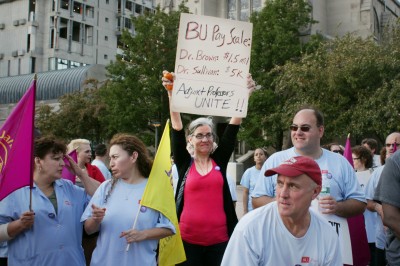
In order to better address concerns and improve teaching conditions, Boston University adjunct faculty announced that it filed the paperwork necessary to take the first steps toward unionizing, according to a Wednesday press release.
“For us, it was really exciting to announce to our colleagues that we filed for a union election. Filing really represents more than a year’s worth of work on the part of adjunct faculty,” said Laurie LaPorte, an anthropology lecturer in the College of Arts and Sciences.
If passed, adjunct faculty could join the Service Employees International Union 509 regional and national Adjunct Action campaign, which includes Tufts, Northeastern and Lesley universities, according to the release.
The paperwork was filed with the National Labor Relations Board, which will determine the date of the vote.
Some main concerns adjuncts face are job instability, working conditions, wages and ineligibility for health insurance benefits, LaPorte said.
“Adjuncts tend to be fairly isolated on campus,” she said. “A lot of times they don’t have offices. We don’t participate in department meetings. We don’t have a voice on the university faculty council.”
Sixty-six percent of BU faculty are not on the tenure track, and 41 percent of BU faculty are part-time, according to the release.
Daniela Fagnani, a part-time Italian lecturer, said the current conditions for adjuncts pose a risk to how well they are able to teach students.
“We care about being able to provide our students the best and being able to have a job that doesn’t worry us or put us in a position where we can’t finish the job or fulfill our requirements,” she said.
Fagnani said she looks to Tufts University as an example of how adjuncts could unionize and eventually negotiate a contract with BU. Recently, Tufts adjunct faculty members approved its first union contact, according to the release.
Daniel Hudon, a criminal justice lecturer in BU’s Metropolitan College, said he is excited about filing for a union election and the potential changes that could follow.
“I’m hoping that unionizing will mean that we part-time faculty can bargain with the university for better work conditions,” he said in an email. “We provide an important service to the university, but many of us (myself included) have to teach at multiple places to make ends meet. The university relies on our contribution to its academic and intellectual culture, and so I see forming a union as a way to have the university acknowledge our contribution more formally.”
A BU official was not available for comment.
John Griese, a member of the Student Labor Action Plan, said the movement to advocate for adjunct professors is gaining traction nationwide and occurring at a historical rate, which helps to spread awareness about the issue.
“It’s a shift from theoretical planning to being out in the open and taking those first steps,” he said. “Adjuncts now get their moment to come out and get the respect and job security they deserve. “This is their opportunity for them to define the narrative for the situation and have the say in how things go from here.”
One way to better address the problems adjunct faculty faces is to realize that they are not given the same benefits and treatments as their full time counterparts, Griese said.
“Adjunct professors are a symptom of the times,” he said. “People tend to think of the image of a full time professor in the past who got pensions and benefits, but the reality is that part time faculty members don’t.”
Fagnani said moving forward, she hopes that BU will build on its own efforts to make sure part-time faculty concerns are heard and realized.
“We need to use the momentum, and we need to do our best,” she said. “We don’t know about the outcome of course, but we are hopeful that things are going to change. I’m very happy about it, and I am very positive about this new development. The wheels are moving, and something good is going to come up.”























































































































